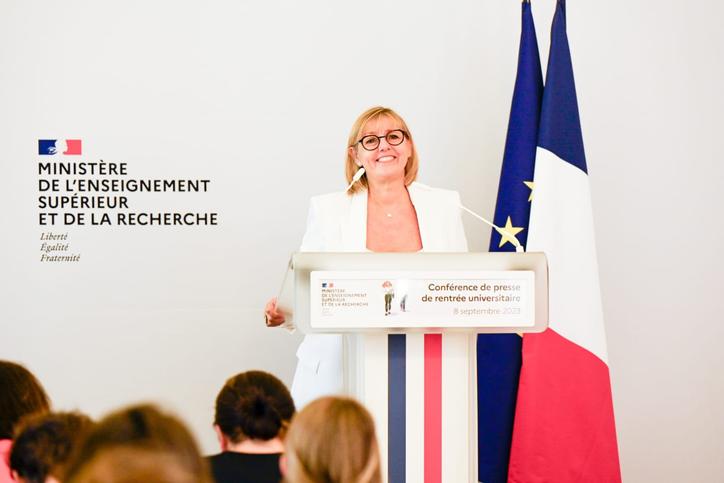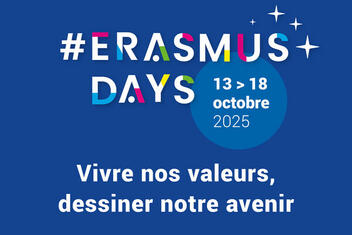
Autumn press conference 2023: following-up students, supporting researchers and boosting cooperation agreements
In her traditional Autumn press conference on Friday 8 September, Sylvie Retailleau, French minister for Higher Education and Research, detailed major actions by the ministry in favour of students, such as social follow-up, orientation, internationalisation or access to research.
Rappelant d’abord que « dans un paysage international complexe, mais aussi mouvant et compétitif, la France doit rester une grande nation scientifique et une terre d’innovation », la ministre s’est attachée à en définir les contours et à présenter les grandes orientations à venir.
Pour une égale réussite
Parmi les points évoqués, on retiendra d’abord les efforts d’accompagnement social déployés par le Gouvernement français. Afin « d’assurer les conditions d’égale réussite des étudiants », le ministère a annoncé un « renforcement de l’accompagnement déjà historique ».
En effet, outre une revalorisation des bourses et une augmentation du nombre de boursiers, l’année 2023 verra se poursuivre une limitation des coûts de la restauration et du logement qui peuvent bénéficier à l’ensemble des étudiants, nationaux comme internationaux. Toutes les composantes de la vie étudiante (logement, restauration, santé) font l’objet d’actions concrètes dès cette rentrée :
- pérennisation d’une tarification très sociale des repas pour les étudiants boursiers et étudiants en situation de précarité financière ;
- gel de la tarification des repas de la restauration universitaire (tarification très sociale à 1€ et à 3,30€ pour tous les autres étudiants) ;
- gel des loyers dans les résidences universitaires CROUS ;
- revalorisation des APL (aides personnalisées au logement), de 1,6% au 1er avril 2023.
Un accès facilité à l’orientation
Depuis la Loi relative à l’Orientation et à la Réussite des étudiants (ORE) de 2018, l’accompagnement à l’orientation a été renforcé et constitue « une priorité du Gouvernement au service de la continuité des parcours vers le supérieur ».
A ce titre, outre le dispositif Parcoursup qui a amélioré son contenu informatif (plus de 22 500 formations proposées), la nouvelle plateforme nationale Mon Master a « d’ores et déjà permis l’accès en master à plus d’étudiants que par le passé », souligne le ministère. Mon Master, plateforme d’information et de candidature en 1ère année de master, met directement en relation les candidats et les formations. Ce qui permet de simplifier les démarches de candidatures, avec un guichet unique, un calendrier unique, un processus dématérialisé. Ainsi, au 6 septembre, 156 010 candidats ont pu recevoir une proposition d’admission, soit près de 10 000 de plus que l’an dernier.
Autre point important en matière d’orientation, l’amélioration de la transparence de l’offre de formations supérieures, « grâce à une vision plus claire et plus lisible de l’enseignement supérieur privé ». Jugeant en effet nécessaire de renforcer « le rôle de l’État pour permettre de mieux identifier et qualifier les formations privées qui sont destinées à de jeunes étudiants en formation initiale », le ministère a décidé de mettre en place un label de qualité reconnaissant spécifiquement les formations qui sont adaptées à ces jeunes étudiants, en termes de pédagogie et d’accompagnement de leur parcours académique et de construction de leur projet professionnel.
La recherche au cœur de l’enseignement supérieur
Comme le souligne le ministère, « la force des universités et des établissements de l’enseignement supérieur français repose sur l’articulation entre formation, recherche et innovation ». Les chercheurs et enseignants-chercheurs sont ainsi placées « au cœur des laboratoires de recherche française et contribuent à la formation des jeunes pour et par la recherche ».
Grâce à la Loi de Programmation de la Recherche, en France, le financement de la recherche est en nette croissance et notamment en ce qui concerne les docteurs et le doctorat. Concrètement, selon les dernières statistiques, le nombre de docteurs diplômés a augmenté de 2% en 2022 pour s’établir à 13 900. Des mesures ont en effet été prises afin de permettre une meilleure reconnaissance du doctorat, parmi lesquelles :
- la création du contrat doctoral de droit privé et du contrat postdoctoral ;
- l’augmentation de 20% du nombre de contrats doctoraux financés par le ministère ;
- la revalorisation de 30% de la rémunération des nouveaux contrats doctoraux ;
- l’augmentation de 50% d’ici 2027 du nombre de Conventions industrielles de formation par la recherche (CIFRE).
Dynamiques européennes
Autre point important, l’internationalisation de l’enseignement supérieur français. Selon le ministère en effet, l’enseignement supérieur et la recherche français sont également au cœur des dynamiques européennes et internationales.
La France est ainsi le moteur du projet d’Universités européennes. Depuis 2017, 50 Universités européennes se sont constituées comme des alliances d’établissements d’enseignement supérieur. Ces nouveaux établissements « constituent une brique complémentaire à la construction de l’Espace européen de l’enseignement supérieur » dont l’objectif est de garantir que les systèmes d’enseignement supérieur en Europe soient compatibles et que les étudiants, les chercheurs et les universitaires en Europe puissent collaborer, étudier ou travailler plus facilement à l’étranger.
Avec ces 50 établissements français mobilisés, la France est « l’un des pays européens les plus impliqués dans l’initiative des Universités européennes », comme le relève le ministère.
Un pays ouvert sur le monde
Dernier point envisagé dans le dossier de presse, dans le droit fil du précédent, celui de l’attractivité internationale. En matière d’enseignement supérieur et de recherche, la France, souligne encore le ministère, est historiquement un pays ouvert sur le monde. Ainsi, les « coopérations sont nombreuses et son excellence académique est reconnue à l’étranger », grâce notamment à quatre facteurs que rappelle et développe le ministère :
- un enseignement de rang mondial : dans le dernier classement de Shanghai, la France occupe la 3e place mondiale et la meilleure université du monde en mathématiques est française. En 2022, le top 5 des meilleurs masters en finance du Financial Times est 100% français ;
- une grande nation de recherche et d’innovation : la France se classe au 2e rang mondial pour les médailles Fields (mathématiques) et en 4e position pour les Prix Nobel. De même, la France est aussi le 2e pays européen le plus innovant (statistiques de l’Office européen des brevets) ;
- un pays d’accueil pour les étudiants internationaux : la France est le 6e pays d’accueil des étudiants internationaux et le 4e pays d’accueil des doctorants internationaux, notamment grâce au programme Bienvenue en France ;
- une large coopération universitaire et scientifique: en lien avec le réseau diplomatique, des coopérations internationales sont développées « comme les campus franco-étrangers ou les partenariats Hubert Curien (PHC), qui visent à favoriser les mobilités et le travail entre équipes de chercheurs ».
Related contents
Recommended News




















































